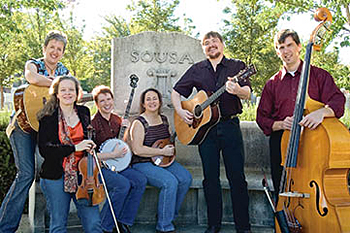

Finding a Voice
Caryn Fox ’84 is a founding member of Dead Men’s Hollow, a highly regarded Washington, D.C.–based bluegrass/old-time band. As the band prepares to release its third album this summer, one of her five bandmates, freelance writer Amy Rogers Nazarov, talks with Fox about her years at the University, how blowing an audition helped her find the right major, and why Dolly Parton is one of her heroines.
Did you take any classes at Eastman?
I wanted to. After singing in musicals growing up—in shows at summer camp since I was 10, in Fiddler on the Roof at my high school, in my synagogue’s production of The Sound of Music, when I played Maria—I figured I had a decent shot at voice lessons there. Yet when I auditioned freshman year, I got turned down because I couldn’t read music.
That must have been tough.
Yes, it was. In fact, I put performing on the back burner for the next four years, sampling everything from math to political science to accounting to psychology to English.
Was Rochester a good environment in which to dabble like that?
Definitely. I came in with no idea what I wanted to do. At Rochester, I felt surrounded by people who inspired me to find the place I could excel. Ultimately, classes in creative writing, coupled with publishing a short story in a campus publication, helped me home in on my true calling.
Which was . . .

BLUEGRASS BEAT: Caryn Fox ’84 (center, with mandolin) is a founding member of the Washington, D.C.–based bluegrass band Dead Men’s Hollow.
Majoring in English! I was the geek sitting in the stacks, laughing while reading Shakespeare’s plays. By the time I graduated, I knew that I wanted to be a writer and I landed a job in New York with a legal-publishing company.
How did you bring music back into your life?
After graduation, I began classical voice lessons and performed several times as an operatic soprano, including at a nightclub in Manhattan. And winning the role of Lucy in 1986 in an off-off-Broadway production of You’re a Good Man, Charlie Brown boosted my confidence even more.
How did you wind up here in the Old Dominion?
I got married and had kids. Between my job and small children at home, music once again was tabled. But in 2001, some coworkers and I formed a country/rock act we called Dead Men’s Hollow, named after a Civil War–era nickname for a part of Arlington, Va., that’s right on the Potomac River.
What were your goals with the band?
Just to play out and have fun. We landed a few gigs, where we played original music plus songs by Hank Williams, Johnny Cash, and others. When our drummer and bass player left, we went in a different creative direction, partly influenced by music in the 2000 film, O Brother, Where Art Thou? We had tried to be this alt-country band with a harder edge, but the more we wrote our own songs, the more we sought an acoustic sound. It was a natural evolution.
What does Dead Men’s Hollow sound like today?
Three-part female harmony vocals backed by upright bass, fiddle and guitar are our trademark. We have performed everywhere from the Kennedy Center to Fort Riley, Kan. We’ve won Bluegrass CD of the Year and Bluegrass Group of the Year, and our first CD, Forever True, won Debut CD of the Year in 2005 from the Washington Area Music Association. You can find our second CD, Two-Timin’, at Borders and on Amazon.com. We’re releasing our third this summer, and we all play and sing on it. I’m learning to play the mandolin.
What do you enjoy most about song-writing?
It’s cathartic. I’ve always considered myself a writer, first and foremost. I’ve always written poetry and short stories. At Rochester, I got As in only two courses at the school, both writing courses. Writing songs combines my two passions: music and writing.
What musicians influence you?
There are a handful of phenomenal songwriters that make my jaw drop. Darrell Scott is one; so often I’ll hear a song I love on country music satellite radio, and it turns out to be one of his. He has a way of writing songs that are so personal and real. Dolly Parton is another. She’s always said that singing is secondary, that she sings to pay the bills and that she’s a songwriter above all. That’s inspiring to me, that such a great singer has an even deeper love of songwriting.
D.C.–based Amy Nazarov contributes to Cooking Light, The Washington Post Express, and other publications.
